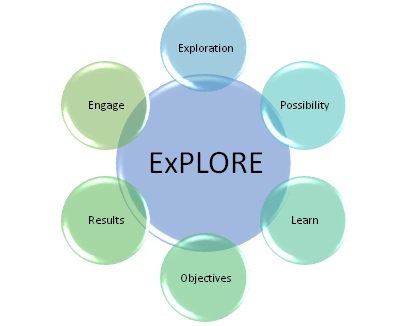A Coaching Model By Brian Mason, Management Development Coach, UNITED STATES
ExPLORE Coaching Model Managers Guide
 The ExPLORE coaching model guides managers through the complexities of the workplace.
The ExPLORE coaching model guides managers through the complexities of the workplace.
You’ve just landed your first management role and you’re feeling exhilarated, proud of your hard work, and down-right deserving of this awesome opportunity. Recalling the highlights from the interview, you really shined as you described your experiences and articulated some impressive ideas for change. Soon, reality sets in, and it dawn on you that YOU are now responsible for the outcomes of others and you wonder, “How do I even get started?”
One of the fastest ways to see results and bring accountability to your efforts is to find an accountability partner. Accountability can come from a mentor, a peer, or, in its highest form, a coach. Whatever the case, it is critical that you acquire an accountability relationship and give your partner license to lay out the truth. As your coach and accountability partner, I provide frank, objective feedback on your performance, create an ongoing expectation for productive progress, and provide critical brainstorming or even expertise when needed.
 I take new managers through a six-step exploration process that helps managers create the structures they need to lead and get results. We focus on six key steps every manager needs to master to deliver an exceptional manager-employee experience.
I take new managers through a six-step exploration process that helps managers create the structures they need to lead and get results. We focus on six key steps every manager needs to master to deliver an exceptional manager-employee experience.
Just as a compass is used to find one’s direction, the ExPLORE coaching model guides managers through the complexities of the workplace. It can be applied to one’s own actions as well as when working directly with their direct reports.
ExPLORE – Six-Step Process
Exploration – As with any journey, one must begin with a curious approach.
Possibility –The totality of possibility is explored throughout the coaching experience.
Learn – Exploration and development are based on curiosity and learning. Life is learning.
Objectives –Successful coaching is built around objectives. An objective is a thing we are aiming towards, i.e. the goal.
Results – With our objective in hand, we set out to identify the key results that are truly meaningful and possible to achieve.
Engage –We take actionable steps to experience the situation with a new sense of confidence and awareness.
The Four Domains of Trust
While we progress through the six-step ExPLORE process, we continuously check in on our progress as it relates to the four domains of Trust. With any relationship, trust is crucial. It can be difficult to obtain and easy to lose. The manager-coach/ direct report relationship is one of the most important for employee engagement and a sense of belonging. The four domains include:
- Sincerity: Alignment between your private and public conversations in your words, actions, and body language. Do you say what you mean and mean what you say? Can I believe you are the person you say you are?
- Competence: Recurrently producing satisfaction for others in a particular field. Are you capable of meeting expectations? Can I trust you can show up for me as you say you will?
- Reliability: Effectively managing and fulfilling your commitments. Can you be counted on? Can I trust that you’ll show up? Can I depend on you?
- Care: Being emotionally involved in the relationship and outcome and connected to the reason or context. You know and agree with “why” it’s important. Do you actually care about the situation or relationship? Do I trust that you’re emotionally invested?
Non-Violent Communication Process (NVC)
Marshall Rosenburg introduced the non-violent communication process that helps provide the framework for our work together. NVC gives us a process to follow that helps to focus on perceived needs and feelings in a safe, non-judgmental manner. It provides us language to use to identify needs and to formulate a request for those needs to be fulfilled.
The process involves the following four steps, while simple, not always easy to follow:
- Observe: Describe the situation without evaluating or judging. Observations are completely objective, like a camera that was recording the situation.
Coaching Questions: What exactly happened?
- Identify a feeling: State how you felt when you observed the situation. Feelings are always related to the body, and never involve others. Attempt to name the feeling clearly, to understand how the situation affected you.
Coaching Questions: How did the situation make you feel? This associates the fact with the emotion a situation creates.
- Identify your need or desire: Get clear on what you need or desire from the other person clearly. A need is always about us, not about another, and is always a basic human quality. Then, tie the need with the emotion. We say what needs of ours are connected to the feelings we have identified.
Coaching Questions: What do you need? What would you like to be the outcome?
- Formulate a request: Phrase a specific request positively, speaking kindly, but firmly and clearly, without unnecessary emotions (such as sarcasm). This fourth component addresses what we are wanting from the other person.
Coaching Questions: What is it really that you want to request from the other person? Could you state what would be the most ideal outcome for you?
Next Steps
It is crucial to the success of any business to equip supervising managers fully and adequately with curiosity-based coaching philosophy, the leadership skills, and the coaching tools needed to lead people through the next decade. By 2030, Deloitte experts predict a highly cooperative, engaging, and socially inclusive atmosphere will dominate our future workplace and communities. Managers and coaches will be crucial to creating and sustaining this atmosphere.
ExPLORE will positively impact your relationships and productivity. As your coach and accountability partner, I’ll help you build upon your own trust and the trust others have in you. Just knowing you have someone waiting for your next progress report can spur you to better results. Let’sExPLORE how you can maximize your performance and increase employee engagement; the time is now to become your very best.
Learn How to Create Your Own Coaching Model
Your Coaching Model reflects your values,
philosophies and beliefs and must communicate who you will coach
and the problems you will solve. Read more about creating your coaching model
References
“2021 Deloitte Global Human Capital Trends.” Deloitte Insights
“The Center for Nonviolent Communication.” Center for Nonviolent Communication
Keller, G., & Papasan, J. (2017). The one thing: The surprisingly simple truth behind extraordinary results. Austin, TX: Bard Press.
Doerr, John. Measure What Matters: OKRs – the Simple Idea That Drives 10x Growth. Penguin Business, 2018.